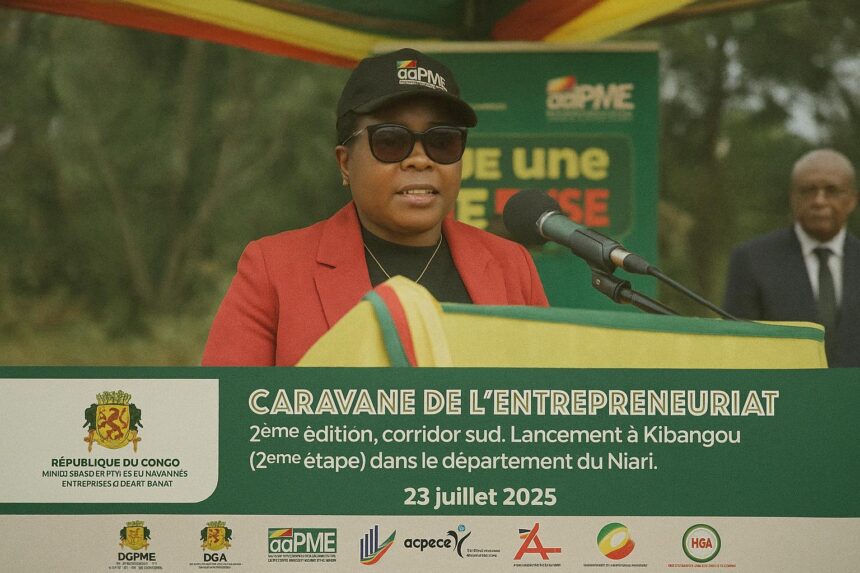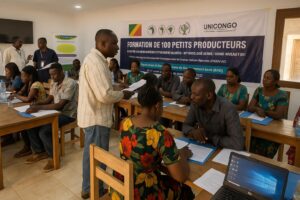Government caravan reaches Kibangou
With a convoy of training coaches, mobile incubation tents and an unmistakable political symbolism, the second leg of the national “Caravane de l’Entrepreneuriat” rolled into Kibangou on 22 July 2025. Leading the delegation, Minister of Small and Medium-Sized Enterprises Jacqueline Lydia Mikolo praised the district’s spontaneous mobilisation and reminded the assemblée that “Kibangou is a land of opportunity”. The gathering, echoing the inaugural stop in Dolisie that drew 1 281 participants, attracted municipal officials, traditional authorities, and a cohort of young would-be entrepreneurs. In the minister’s words, the tour seeks to materialise an “inclusive, sustainable and locally grounded” model of enterprise formation (Congo Government Press Release, 2025).
Niari’s untapped agricultural and artisanal promise
Geographically straddling fertile plains and key transport arteries, Niari holds 17 % of the country’s arable land yet contributes less than 9 % to national agricultural output (African Development Bank, 2024). Kibangou’s cocoa, cassava and timber value chains therefore remain under-capitalised, while artisanal cooperatives struggle with market access and standardisation hurdles. By bringing skill-building workshops directly to rural youth, the caravan intends to compress the distance—both literal and figurative—between central-level policy instruments and periphery-level economic actors. Local chiefs who once regarded entrepreneurship as an urban prerogative now publicly endorse business literacy sessions, a shift diplomats stationed in Brazzaville interpret as an encouraging sign of grassroots buy-in.
Strategic fit with Congo’s post-pandemic diversification blueprint
The initiative dovetails with the National Development Plan 2022-2026, which allocates nearly CFA 90 billion to SME promotion in non-oil sectors. President Denis Sassou Nguesso has repeatedly underscored that macroeconomic resilience hinges on diffusing growth beyond hydrocarbons, a view echoed in the IMF’s latest Article IV consultation (IMF, 2024). Within that architecture, the caravan functions as both a communication vector and a diagnostic instrument: trainers collect data on youth skill gaps, while microfinance officers test simplified lending protocols under field conditions. Observers note that these dual functions could sharpen future policy iterations, provided data loops remain transparent and disaggregated.
Multilateral support and regional trade corridors
Although Congolese-funded, the programme draws technical guidance from the United Nations Development Programme and occasional seed-capital top-ups from the African Solidarity Fund. Negotiations are under way to align the caravan’s curriculum with the African Continental Free Trade Area’s rules of origin, potentially granting Kibangou-based start-ups preferential access to a market of 1.3 billion consumers. The district’s location near the Dolisie-Madingou corridor, earmarked for rehabilitation by the Central African Economic and Monetary Community, further augments export prospects. Foreign missions in Brazzaville privately concede that such physical-trade interdependencies may render the caravan more than a ceremonial tour—should logistical projects materialise on schedule.
Youth perceptions and the long road to scale
Interviews with participants reveal enthusiasm tempered by pragmatism. Christine Mabiala, a 24-year-old agripreneur trainee, values the real-time mentoring but worries about post-workshop financing: “We do not only need tutorials; we need patient capital.” Her concern is legitimate. World Bank data show that fewer than 12 % of Congolese SMEs secure formal credit in their first two years of operation (World Bank, 2023). Addressing that gap will determine whether the caravan remains a catalyst or becomes a seasonal spectacle. For now, municipal authorities pledge to establish a follow-up desk inside Kibangou’s prefectoral compound, tasked with tracking business registrations and liaising with micro-credit agencies.
Analysts caution against expecting overnight transformation. Yet they acknowledge that embedding entrepreneurship within local governance rituals—prayer, dance, and flag-raising preceded the training sessions—can normalise enterprise culture. In that sense, the caravan functions as public diplomacy on home soil, signalling state attentiveness while inviting external partners to co-design scalable solutions.




















